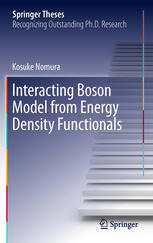

Most ebook files are in PDF format, so you can easily read them using various software such as Foxit Reader or directly on the Google Chrome browser.
Some ebook files are released by publishers in other formats such as .awz, .mobi, .epub, .fb2, etc. You may need to install specific software to read these formats on mobile/PC, such as Calibre.
Please read the tutorial at this link: https://ebookbell.com/faq
We offer FREE conversion to the popular formats you request; however, this may take some time. Therefore, right after payment, please email us, and we will try to provide the service as quickly as possible.
For some exceptional file formats or broken links (if any), please refrain from opening any disputes. Instead, email us first, and we will try to assist within a maximum of 6 hours.
EbookBell Team

4.0
66 reviewsThis thesis describes a novel and robust way of deriving a Hamiltonian of the interacting boson model based on microscopic nuclear energy density functional theory. Based on the fact that the multi-nucleon induced surface deformation of finite nucleus can be simulated by effective boson degrees of freedom, observables in the intrinsic frame, obtained from self-consistent mean-field method with a microscopic energy density functional, are mapped onto the boson analog. Thereby, the excitation spectra and the transition rates for the relevant collective states having good symmetry quantum numbers are calculated by the subsequent diagonalization of the mapped boson Hamiltonian. Because the density functional approach gives an accurate global description of nuclear bulk properties, the interacting boson model is derived for various situations of nuclear shape phenomena, including those of the exotic nuclei investigated at rare-isotope beam facilities around the world. This work provides, for the first time, crucial pieces of information about how the interacting boson model is justified and derived from nucleon degrees of freedom in a comprehensive manner.